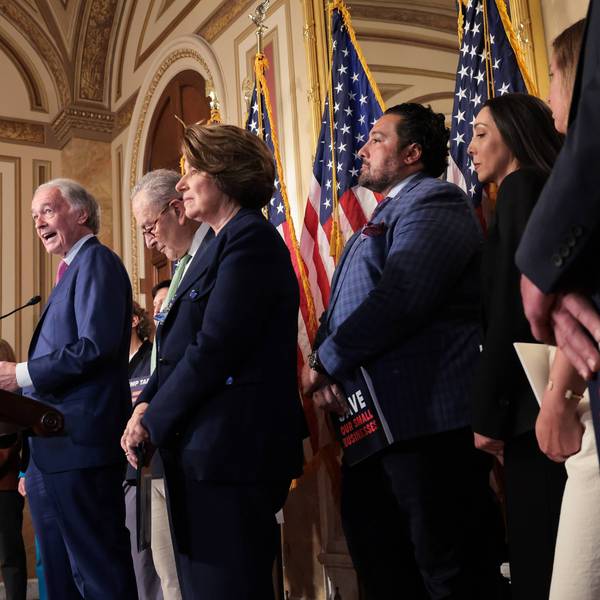As the New York Stock Exchange reached an all-time high this week, you'd think that the good times were back. But that would be incorrect. What happens on Wall Street has very little to do with what's going on in the real economy. Corporate profits have never been higher, but--excluding the highest earners--real wages are at a 40 year low. With this fundamental disconnect--and political gridlock in Washington--it's unlikely that our economy will return to health anytime soon.
The good news is that in thousands of communities across America, people are working together to bring about what may be the beginning of a new national economic contract. Where Washington and Wall Street are falling down citizens are banding together, not just to ameliorate the suffering caused by national stagnation, but to launch innovative economic initiatives that might create a brighter, fairer future for everyone.
These localized efforts, which fall broadly under the banner of "post-growth economics," are beginning to stitch themselves together into a national force that holds the promise of stronger neighborhoods and greater individual well being. As Dr. Margaret Flowers, co-founder of Its Our Economy and co-author of the report "An Economy for the People and the Planet" said to me recently, the point of the post-growth movement is to create "an alternate economy that's designed to meet human needs."
With its focus on human beings and the preservation of the natural habitat that sustains us, this growing movement is actually the fusion of two areas of alternative economic thought, one environmental and the other social. For decades both have recognized that our current economic structure is unsustainable and leaves too many people behind. Modern capitalism has core deficiencies that harm the planet and contribute to human suffering. Rather than relying on the national political class to soften the blow, the post-growth movement seeks to remake capitalism from the bottom up.
Instead of subsidizing global corporations focused on scattering short-term profits amongst distant shareholders, post growth initiatives foster local economies that are cooperative and based on trust.
Think it's too good to be true? Gladly, it's not. Here are three ways in which these alternative economic values are playing themselves out and providing hope.
#1 Local Is Everything
One way to strengthen communities is to keep profits close to home. That's the goal of the alternative currency movement.
What is alternative currency? It's money that can be used within a specific geographic area, amongst specific businesses.
Take for example Berkshares, which serve as an alternative currency for the Berkshire region in Western Massachusetts. They're backed by five local banks and accepted at over 400 local enterprises. This is how it works: An individual takes U.S. dollars to a local bank, buys Berkshares at a discount (you get 5 percent more than the value in dollars), and then uses Berkshares to purchase goods and services at the local companies that accept them. The upside is that the benefits of economic activity remain in the place where you live and work. Started in 2006, Berkshares are going strong, with similar experiments across the country underway.
Another way to strengthen communities economically is for neighborhoods to produce more of what they consume. That's exactly what the Detroit Black Food Security Network decided to do in response to the fact that there is not one major supermarket in Detroit, a city of 700,000 people.
Rather than waiting for established political and economic structures to respond, citizens got together and formed an organization that now leases 10 acres of parkland from the city itself. The Network is looking to cultivate even more land and expand to year-round production by involving the surrounding neighborhoods in the effort.
In fact, the entire urban food movement grew out of local communities--overlooked by global corporations--that were trying to provide provide essential food security. And grown it has. New York City now has over 600 urban gardens alone and the number of farmer's markets nationwide has quadrupled since 1994.
#2 Sharing Creates Prosperity
A key tenet of our current economy is that individual consumption creates wealth and well being. But more and more, the opposite is shown to be true. As a result, economic cooperation is seen as the new way forward.
The formal "sharing economy" through car-sharing services like Zip Car and the divvying up of living space through sites like Airbnb is already a multi-billion dollar business. In addition to sharing goods, however, there is also a rise in the sharing of labor through "time banks."
Time banks allow members to provide services--such as repairing a sink--in order to earn "bank credits." These credits are then used to obtain other services, like car repair, sewing or even shoveling snow, from the wider network of bank members. Time banks are non-cash exchanges and based on sweat equity. TimeBanks USA estimates that there are close to 1,000 time banks across the country operating in 40 states.
But sharing and collaboration not only work between individuals. These principles can also operate on a vast scale in capital-intensive areas, such as homeownership, typically dominated by large corporations like those on Wall Street. This is exactly the case with community land trusts, or CLTs.
CLTs lower home prices to within the reach of low- to moderate-income earners. They do so by dividing, essentially sharing, homeownership between the CLT and the homeowner. The trust owns the land and the homeowner the home. Even the Federal Reserve--America's central bank--has taken notice of the impact that the 200 CLTs across America can have. The Fed writes that CLTs "improve neighborhood stability and preserve the long-term affordability of homeownership opportunities," adding that the effectiveness of CLT's sharing-based system stands "in contrast to the negative impacts of foreclosure" brought on by the big banks.
#3 Trust Is Good Economics
Cleveland-based Evergreen Cooperative trusts employees not only to do their jobs but with ownership of the company.
Launched with capital from the local government, foundations, healthcare organizations and universities, this worker cooperative seeks to maximize employment by providing essential services to the founding organizations and the wider community. Instead of holding down wages to wring out profits shipped elsewhere, Evergreen invests the money it makes into new local businesses under the cooperative. They've already started three: the first green laundry in Cleveland; a green energy and solar panel company; and a three acre local farm. The goal is to create seven more unique ventures, including a community land trust.
With workers as owners, Evergreen ensures high-quality work, holds itself accountable to achieve its business aims, and shares its profits equitably. The fact that Evergreen draws its employee-owners from the surrounding neighborhood--which is almost all people of color and where the median household income is $18,000--makes its existence all the more crucial and inspirational.
Evergreen shows that with the right values, we actually do know how to build economies that work for everyone, not just economic elites.
Whether post-growth economics can strengthen to become a true counterweight to three centuries of economic doctrine is an open question. But what is clear is that whatever we're doing now isn't working and the time has arrived for new thinking.
Of course thought leaders such as former Vice President Al Gore, Richard Heinberg, author of The End of Growth; and environmentalist Paul Gilding have long made this point. Perhaps it's not only time to listen but to act.




